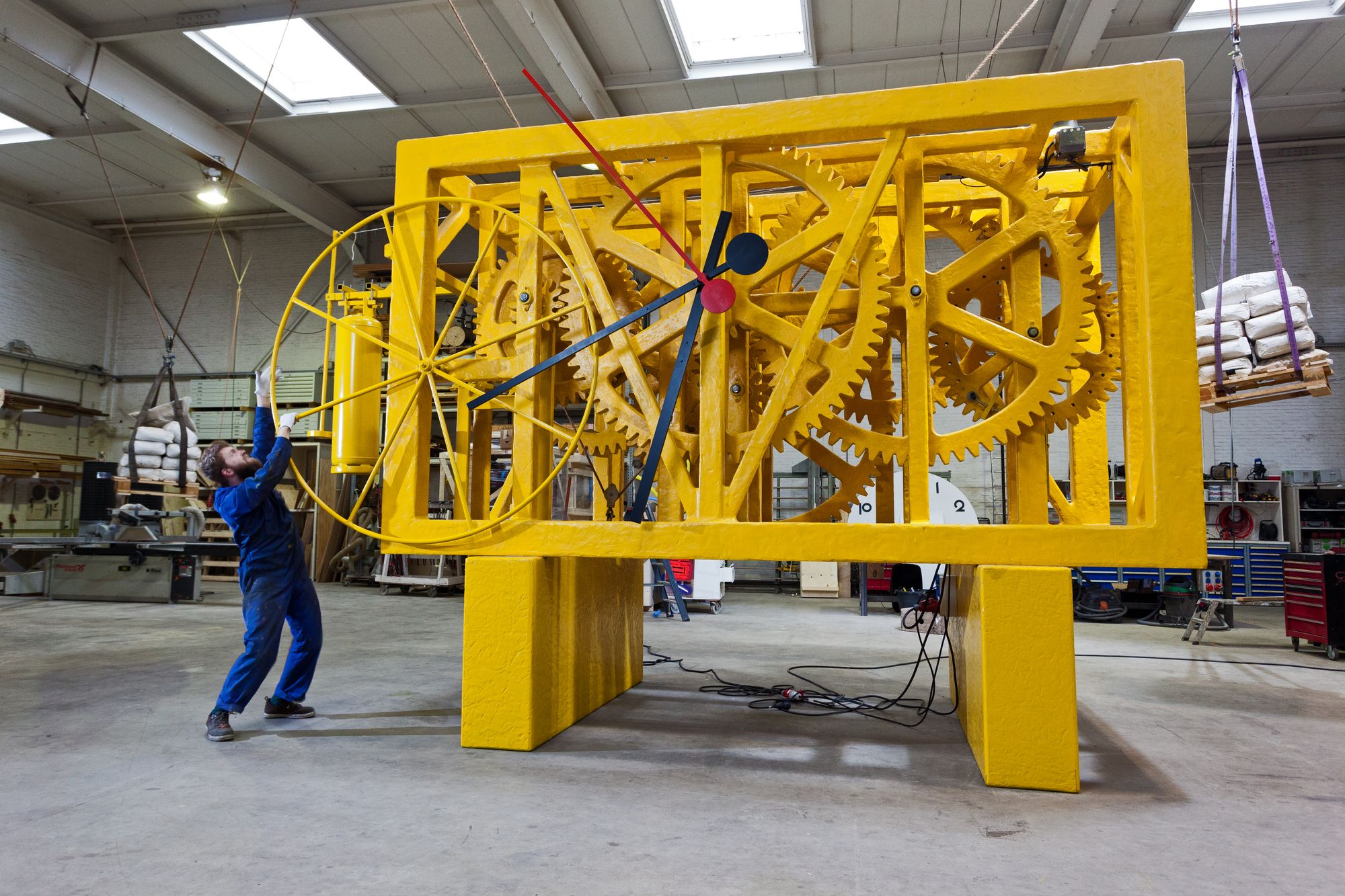
The End of Everything: The Acceleration of Atelier Van Lieshout
Have we reached the end of capitalism? The rapid depletion of global resources could prove the need for an alternative economic model. This idea is further articulated in the political and social theory of accelerationism, which suggests that the expansion—and ensuing destruction—of capitalism is the only way to bring about radical social change.
On the occasion of The CryptoFuturist and the New Tribal Labyrinth, an exhibition by Atelier Van Lieshout (AVL) which envisions utopian modalities for living while warning that these can just as likely lead to a world of violence and extremism, Pioneer Works hosts an evening of consideration and conversation on this topic of economic progress and destruction.
AVL’s body of work—largely made up of conceptual sculptures and architectural sites—is widely known for illuminating the connection between labor, power, and revolution and a potential new world order of scarcity and subsequent self-sufficiency. These works of art force viewers to posit the possibility of the end of capitalism. What, then, emerges in its place? When will that new economic system eventually break down under the inevitable cycle of creation and destruction that plagues the progression of civilization? In The CryptoFuturist, a fictional tribe of characters, the cryptofuturists, are living through an acceleration beyond capitalism and offering suggestions for economic alternatives through art, architecture, and design. A final question, then, remains: what is the role of the artist/designer in constructing utopias?
Glenn Adamson is Senior Scholar at the Yale Center for British Art, New Haven, USA, and the author of books including The Invention of Craft (2013).
Paola Antonelli joined The Museum of Modern Art in 1994 and is a Senior Curator in the Department of Architecture & Design, as well as MoMA’s founding Director of Research & Development. With a Master’s degree in Architecture from the Polytechnic of Milan, Paola Antonelli has also earned Honorary Doctorate degrees from the Royal College of Art and Kingston University, London, the Art Center College of Design, Pasadena, and Pratt Institute in New York. She has curated numerous shows, lectured worldwide, and has served on several international architecture and design juries.
Her most recent exhibition, Items: Is Fashion Modern?, devoted to 111 items of clothing have had a strong impact on the world in the past 100 years, opened at MoMA in October 2017. She is currently working on the next Triennale di Milano, entitled Broken Nature (March 2019); on the book States of Design; and on a new Theory of Everything for design.
She can be found on Twitter as @CuriousOctopus, and on Instagram as @paolantonelli.
Timothy Furstnau is a writer, artist, and curator. His most recent book How It Hurts, a study guide for pain examinations, was recently released by Publication Studio (Portland). As part of the collaborative studio FICTILIS, his work has been exhibited widely. He has co-founded and curated several ongoing projects, including Museum of Capitalism, a museum memorializing the capitalist era, Writ Large, a program of screen-based writing, Shadow Art Fair, Michigan’s first DIY craft fair, and the microcinema and event space Bluish Barn.
Andrea Steves is an artist, curator, researcher and organizer currently based in Brooklyn. Her recent projects deal with museums and public history, monuments and memorials, and the complex legacies of the Cold War. Andrea also works in the collective FICTILIS and the Center for Hydrosocial Studies, and is co-founder of the Museum of Capitalism. She is currently a visiting scholar at the Center for Capitalism Studies at The New School.
The Museum of Capitalism is an institution dedicated to educating this generation and future generations about the ideology, history, and legacy of capitalism, through exhibitions, research, publication, collecting and preserving material evidence, art, and artifacts of capitalism, and a variety of public programming. A new exhibition of the museum is coming to New York City in Fall 2019.
Anwar Shaikh is Professor of Economics at the Graduate Faculty of Political and Social Science of the New School University, Associate Editor of the Cambridge Journal of Economics, from 2000–2005 Senior Scholar and member of the Macro Modeling Team at the Levy Economics Institute of Bard College. His most recent book is Capitalism: Competition, Conflict, Crises from Oxford University Press 2016, his intellectual biography is included in the book Eminent Economists II from Cambridge University Press 2014, and in 2013 he was awarded the Social Science Prize of the NordSud International Prize for Literature and Science of the Fondazione Pescarabruzzo in Italy for his paper on George Soros’ notion of reflexivity entitled “Reflexivity, Path-Dependence and Disequilibrium Dynamics” in the Journal of Post Keynesian Economics, Fall 2010. He was the recipient of two successive grants from the Initiative for New Economic Thinking (INET) in 2011–2012. A prior book was Globalization and the Myths of Free Trade (2007, Routledge). He has written on international trade, finance theory, political economy, macroeconomic policy, the welfare state, growth theory, inflation theory, crisis theory, national and global inequality, and past and current global economic crises. Some recent articles are “Income Distribution, Econophysics and Piketty,” Review of Political Economy, 2016, 18–29 July; “Race, gender and the econophysics of income distribution in the USA,” with Nikolaos Papanikolaou and Noe Wiener, Physica A 415 (2014) 54–60; “On the role of reflexivity in economic analysis,” Journal of Economic Methodology (2014), 439–445; and “The First Great Depression of the 21st Century,” Socialist Register, (2011), Fall.